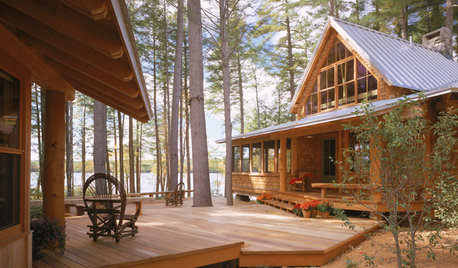Taking risks -- did they pay off?
User
8 years ago
Featured Answer
Sort by:Oldest
Comments (28)
Related Discussions
don't you love when being lazy or too busy pays off??!
Comments (6)Good for you!! Volunteers/freebies are always welcome......at least if they are actual flowers and not the kind of weeds that spread like wildfire if you look the other way for a day or two. :) I always purposely leave the seed heads on a lot of my plants. I try to deadhead the ones that are extremely prolific, but don't always get to them either. I do it over the summer, but try to leave them in the fall so that the birds can eat them over the winter. That is why people are always asking why I have so many plants to give away.......especially 'rose of sharon'. I must have given away a hundred of them or more over the last couple of years. Thats not counting the ones that I didn't let get too big. Once they reach about four or five inches, I can't throw them away, so I let them grow a bit bigger and give them away. I figure the greenhouse that is a few blocks from me has been wondering why their sales of 'r of s' has gone down! LOL! I guess your clue as to the fact that it was a flower should have been that it wasn't growing out of control, but behaving and not growing too much. Your patience (forced or otherwise) really paid off!...See MoreTo pay off or not to pay off mortgage - pls check my #'s?
Comments (38)Hi graywings, I started reading this thread without noting the dates the posts were written. Dave, I don't want to put you on the spot, but I am wondering how the accounts you spoke of in 2007, the 72c Guaranteed Savings accounts (equity-indexed fixed life contract, or annuity contract) have weathered over the last three years. Heh... you can "put me on the spot" in this regard *ANY* time ;~) Both the equity indexed life & annuity products have *VERY* strongly outperformed the unprotected stock index markets over the same periods of time (since 2007. In fact, going back from today to almost as far as you'd like.) Their design is that they capture & credit any annual upside (to a maximum gain,) and lock that amount permanently to your credit. On any years with a downside, your account sits tight with no losses at all (guaranteed by the insured backings of the company reserves and the state's guarantee association (each state's equivalent of a regional "FDIC" in essence.) If you put $100,000 in the S&P 500 for the last decade, you'd actually be holding a bit LESS than $100,000 today (not deducting the tax or management fees that may also be applied.) The same $100,000 in an insured indexing account would be approximately $211,768, net of everything (taxes & fees,) *OR* about an average annual tax-free rate of return of 7.06% Alternatively, those folks who decided to take their working capital OUT of growth, and put it into their real estate equity, have been double-stung; Not only have they gained nothing toward retirement, their equity values have decayed from 10-30% (depending on the area.) The clients who've been with us the last 3-5 years have been rather relieved, ecstatic, and pleasantly bored, all at the same time. Its a very nice financial reality to provide. Cheers, Dave Donhoff Leverage Planner (PS. to re-paraphrase celticmoon; When everyone else's retirement nest-egg is drowning deep underwater... its kinda nice to be riding on the back of a "duck" ;~)...See MoreHow long will it take me to pay off this mortgage
Comments (9)Using those figures, Quicken sez the loan originally would have ended 4/1/18 with a payment of $1235 (seems a month too soon, but whatever). Paying $100 extra on payments 1-24, then $200 extra on paments 25-36 (you say that $200 was "for the last year", so I'm thinking that is June 06 to May 07, Quicken sez the balance now should be 149,425 (pretty close to your 150,000). So the numbers aren't lining up exactly - depends partly on the gap between the closing and the first payment... but close enough. If you went back to the $1549 starting with the June payment, Quicken sez you'd end September 2017 with a last payment of $976, 7 1/2 months ahead of the original loan schedule. (=11,600 less in payments in exchange for that 6,000 prepaid to date. If you keep prepaying $200 as is your plan, Quicken sez your last payment will be in March 2016 for $1439, just over two years ahead of schedule. (= 39,000 in payments saved in exchange for the 25,000 you are prepaying over the life of the now roughly 13 year loan). Folks will argue you should keep the mortgage and invest that $200. There are ways to have it drafted and making it hard to get to. Most certainly you should consider investing instead if you have not maxed out your tax deferred retirement options. Unlike a "rainy day" fund, tht money would be pretty hard to get to. (And I say this as someone who did choose to prepay a 4.75% mortgage! Every situation is different.)...See MoreMarch 22 National Take A Risk in Your Home Decor Day
Comments (27)Remodelfla, I knew we were kindred spirits. Until we got new windows 2 years ago, I had placemats (bought on clearance, but cute enough) on the diagonal on rods over my doorwall and large kitchen window! My mom still asks me if I'm not going to put them back up because they looked so nice. I diplomatically reply that I was tired of the look and prefer to keep them bare for now. Florantha, I think the second treatment looks nice as long as you want to cover the view (at least for the most part), but I think the lace is what makes it look charming. What kind of tablecloth are you thinking of using? Mnerg, you definitely aren't alone with having lots of pics that are waiting to find homes on the walls. No way that's getting tackled today, however. :(...See MoreUser
8 years agoUser
8 years agoUser
8 years agolast modified: 8 years agobossyvossy
8 years ago
Related Stories

GARDENING GUIDES13 Risks to Take for True Garden Rewards
Go ahead, be a rebel. Breaking rules in the garden can lead to more happiness, creativity and connection with the earth
Full Story
LIVING ROOMSRoom of the Day: Dark and Daring Pay Off in a Den Redesign
Indigo walls and woodwork, textured furnishings, task lighting and a media center turn a neglected room into a family hangout
Full Story
BOLD COLORThe Joy of Taking Risks in Design
Not interested in playing it safe? Then check out these 14 bold spaces
Full Story
ROOM OF THE DAYRoom of the Day: Patience Pays Off in a Midcentury Living-Dining Room
Prioritizing lighting and a bookcase, and then taking time to select furnishings, yields a thoughtfully put-together space
Full Story
DESIGN FOR GOODAt-Risk Teens Get a Well-Designed Home and Real Hope
Designers and other volunteers create an apartment to keep older foster kids off the streets, off drugs and on a path to a better life
Full Story
DECORATING GUIDESTop It Off: Wallpapered Ceilings Take the Eye High
Check out these rooms to see the difference a wallpapered ceiling makes
Full Story
HOUZZ TOURSMy Houzz: Family Efforts Pay Off for a 1915 Home
Everyone from the kids to the grandparents helped renovate this Montreal house — and the results show how much they care
Full Story
HOUZZ TOURSMy Houzz: Treasure Hunting Pays Off in Maryland
Artfully layered accessories and patterns plus an eclectic furniture mix make for intriguing decor with vintage flair
Full Story
HOUZZ TOURSMy Houzz: Hard Work Pays Off in a DIY Cottage Renovation
First-time homeowners roll up their sleeves and give their midcentury Montreal home an infusion of style and personality
Full Story
VACATION HOMESMake Your Vacation Home Pay Off
Renting your vacation house when you're not using it makes good financial sense. These tips can help
Full StorySponsored






tibbrix